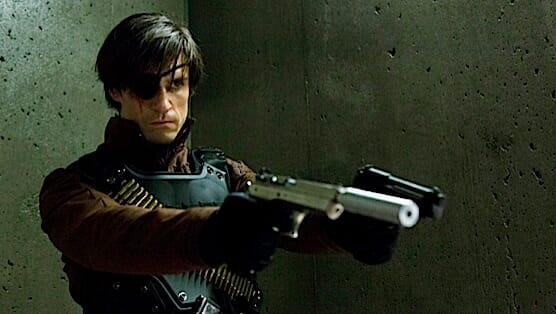Arrow: “Suicide Squad”
(Episode 2.16)

Let’s talk about fan service for a bit. Sure, there are many different categorizations—everything from a fan-favorite female character showing a little skin to Thanos turning around and grinning during The Avengers stinger. In the world of comic book movies and TV shows, fan service is a tricky tightrope to walk. Play your cards right, and such moments organically play into the story and result in rewarding those in the know. Play your cards wrong, and you get X-Men Origins: Wolverine, a movie that tried to clumsily lump in as many beloved characters as possible and only resulted in alienating everyone.
So far in its run, Arrow has been mostly effective in its use of fan service-y moments. “Three Ghosts,” one of the series’ highlight episodes, ended with the origin story of the Flash. This worked because the show has been subtly building towards the moment, sneaking in references to a “particle accelerator” in what initially appeared to be little more than throwaway background lines. “Suicide Squad” accomplishes a similar task. The episode’s assembly of the Suicide Squad, a renowned gathering of mercenaries and criminals in the DC Universe, excels because the show’s writers have been setting the pieces in motion for some time. Each of the Squad’s members—Deadshot, Bronze Tiger, Shrapnel—have appeared in previous episodes, and their skills and personalities have been firmly established. Like the best crossover events in comics, half of the fun of watching this plotline unfold stems from seeing how the characters bump against each other.
The titular storyline begins when Diggle and his ex-wife-turned-current-lover Lyla are recruited by A.R.G.U.S.’s Amanda Waller to participate in a special task force. Their target is a former terrorist named Gholem Qadir, who Diggle saved from death back in his Afghanistan days. Since that time, the man had provided the government with valuable information and been given a clean slate. He has since positioned himself as a legit businessman. According to Waller, however, Qadir has been retaining a lethal nerve gas capable of mass destruction. What follows is an Oceans 11-type scenario in which the team must infiltrate Qadir’s circle and extract the nerve gas. It all culminates in a party (this is Arrow—there’s always a party) where Diggle and Lyla serve as guests while the others seek to find the chemical weapons in the house and remove it.
Considering the history between the two, most of the attention in this plotline is afforded to the tense relationship between Diggle and Deadshot, the man who killed his brother. While I was not initially impressed by Michael Rowe as Deadshot, he’s really grown into his character, displaying the kind of slick, yet mischievous energy that’s a long way from the dull iteration we saw back in season one’s “Lone Gunman.”
Ultimately, like last year’s “Keep Your Enemies Closer,” this is a Diggle-centric episode. As such, “Suicide Squad” represents yet another example of the Arrow writers experimenting with the show’s format. Like “The Promise,” which focused exclusively on the Oliver-Slade dynamic (both past and present), “Squad” benefits from a more narrow, focused POV. The episode is almost 80% Diggle, and David Ramsey once again proves that he can play center stage as well as he does background. Augmenting the story is the flashback structure, which excludes any Island activity in favor of telling us of Diggle’s past experiences in Afghanistan—specifically, his initial encounter with both Lyla and Qadir.
As a result of having to focus on Diggle and his connections, Michael Jai White’s Bronze Tiger is once again pushed more to the side. Sean Maher’s Shrapnel, meanwhile, is almost immediately knocked off when he attempts to use the mission to flee captivity. Demonstrating her ruthlessness, Waller takes Shrapnel’s ill-conceived escape as an opportunity to reveal that she’s implanted devices in each of the members’ heads. The message is clear—disobey and she will mess you up.
-

-

-

-

-

-

-

-

-

-

-

-

-

-

-

-

-

-

-

-

-

-

-

-

-

-

-

-

-

-

-

-

-

-

-

-

-

-

-

-








































